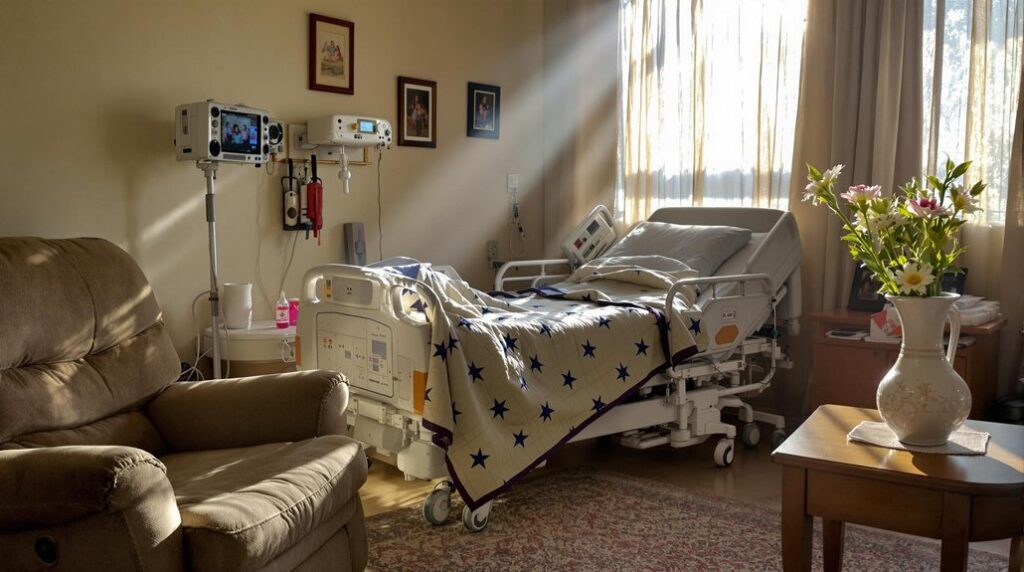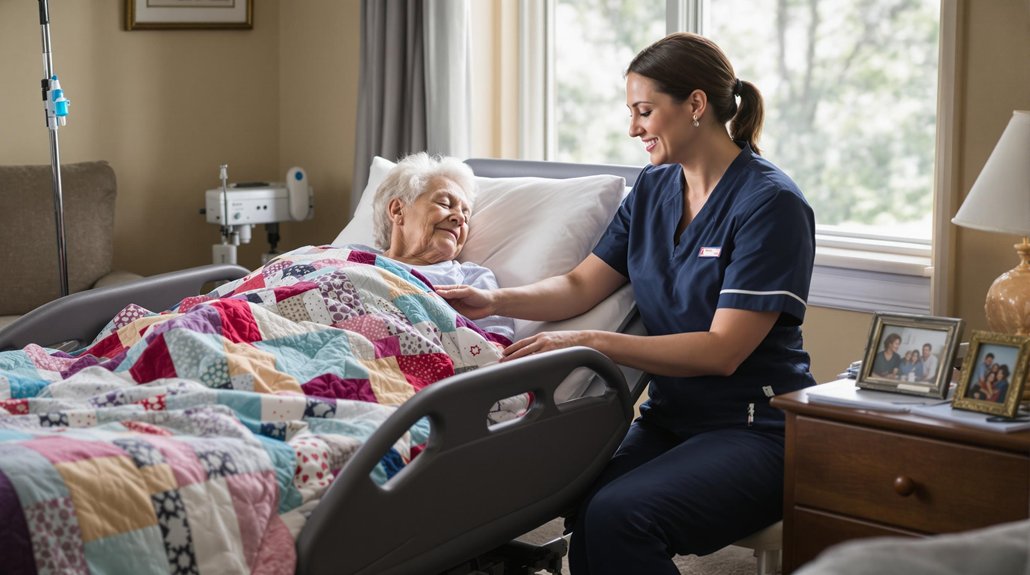Home hospice care means you’ll receive end-of-life medical support for your terminally ill loved one right in your own home. You’ll have a dedicated team of healthcare professionals, including doctors, nurses, and social workers, who visit regularly to manage symptoms and provide comfort care. They’ll offer 24/7 phone support, help with daily tasks, and train family caregivers. This thorough approach guarantees your loved one stays comfortable in familiar surroundings while you get the support you need during this journey.
Understanding the Basics of Home Hospice Care
When a loved one receives a terminal diagnosis, home hospice care provides comfort and support during their final months of life. This specialized care focuses on managing symptoms and enhancing quality of life rather than seeking a cure.
You’ll work with a team of healthcare professionals who come to your home to deliver thorough care. The primary goal of home care is to guarantee patient comfort while allowing your loved one to remain in familiar surroundings.
Your hospice team typically includes nurses, doctors, social workers, counselors, and trained volunteers. They’ll teach you how to handle daily care tasks, administer medications, and recognize important changes in your loved one’s condition.
Hospice teams provide comprehensive training and support, empowering families to confidently care for their terminally ill loved ones at home.
You’ll receive regular visits, plus 24/7 phone support for emergencies. This coordinated approach helps create a peaceful, dignified environment for your family member’s end-of-life journey.
Grief counseling services are available to help family members cope with emotional overwhelm during this challenging time.
The Home Hospice Care Team and Their Roles
A thorough hospice care team brings together multiple specialists who work in harmony to support your loved one’s physical, emotional, and spiritual needs.
Through interdisciplinary collaboration, each team member fulfills specific hospice team roles while coordinating with others to provide extensive care.
Your care team typically includes a physician who oversees medical treatment, nurses who manage symptoms and medications, and certified nursing assistants who help with personal care.
Social workers provide emotional support and help navigate resources, while chaplains offer spiritual guidance based on your family’s beliefs.
You’ll also have access to trained volunteers who can offer companionship and respite care.
Physical, occupational, and speech therapists may join the team when needed to enhance your loved one’s quality of life.
The team focuses heavily on pain management techniques through specialized palliative and hospice care services that ensure comfort throughout the end-of-life journey.
Services Provided Through Home Hospice Care
Through extensive home hospice care, you’ll receive an array of essential services tailored to meet your loved one’s unique needs.
The care team provides thorough pain management, monitoring important signs and adjusting medications to guarantee comfort. You’ll also receive medical equipment, supplies, and prescriptions delivered directly to your home.
Caregiver training is a significant component, teaching you proper techniques for personal care, medication administration, and safe patient handling.
The team offers emotional and spiritual support through counseling services, while helping with daily activities like bathing and grooming. They’ll assist with coordinating appointments and providing respite care when you need a break.
Additional services include dietary guidance, physical therapy when needed, and 24/7 on-call support to address urgent concerns or questions that arise during your caregiving journey.
Private duty nursing services are available to provide specialized medical care and continuous monitoring when required.
Creating a Comfortable Care Environment at Home
Making your home a tranquil sanctuary begins with strategic modifications to enhance comfort and accessibility for your loved one.
You’ll want to rearrange furniture to create clear pathways for medical equipment and caregivers while establishing comfortable spaces for rest and family gatherings.
Consider adjusting lighting levels with dimmer switches and adding soft, soothing elements like cushions and blankets.
Add personal touches that bring joy and comfort to your loved one, such as favorite photos, meaningful artwork, or cherished mementos.
You might also create a dedicated area for medical supplies that’s easily accessible yet discreet.
Keep the temperature consistent and maintain proper ventilation.
If possible, position the bed near a window so your loved one can enjoy natural light and outdoor views.
Working with qualified caregivers can help implement essential fall prevention strategies and safety measures throughout the home environment.
Supporting Family Caregivers During Hospice
While creating a nurturing physical environment supports your loved one, family caregivers also need support to maintain their own well-being throughout the hospice journey. Taking care of yourself isn’t selfish – it’s essential for providing quality care.
| Self-Care Needs | Support Solutions |
|---|---|
| Physical Rest | Respite options through hospice volunteers |
| Emotional Support | Counseling and support groups |
| Daily Tasks | Meal delivery and housekeeping assistance |
Don’t hesitate to ask for help when you’re feeling overwhelmed. Your hospice team can connect you with caregiver support services, including respite care that allows you to take needed breaks. Remember to maintain your own medical appointments, accept help from friends and family, and join local support groups where you can share experiences with others on similar journeys. Skilled caregivers can provide specialized respite care for seniors with chronic illnesses while maintaining their comfort and dignity in a familiar home environment.
Managing Pain and Symptoms in Home Settings
Effective pain and symptom management forms the cornerstone of quality hospice care at home.
Providing comfort through skilled symptom management is essential for delivering exceptional hospice care in the familiar setting of home.
You’ll work closely with hospice professionals who’ll guide you through administering medications and implementing comfort measures. Your loved one’s pain management plan will be tailored to their specific needs, ensuring they remain comfortable in familiar surroundings.
- You’ll learn to recognize signs of discomfort and respond quickly with prescribed medications for immediate symptom relief.
- You’ll master non-medical comfort techniques like repositioning, gentle massage, and cooling measures.
- You’ll receive 24/7 support from hospice nurses who can adjust treatment plans as needed.
- You’ll gain confidence in providing care through detailed training on medication administration and symptom assessment.
Together with your hospice team, you’ll help create a peaceful, comfortable environment where your loved one can receive compassionate care.
Emotional and Spiritual Support in Home Hospice
Beyond managing physical symptoms, emotional and spiritual support plays an essential role in home hospice care.
You’ll work with counselors, chaplains, and social workers who understand the complex feelings that arise during this journey. These professionals help you and your loved one process grief, fear, and anxiety while building emotional resilience.
Your hospice team respects all faith traditions and beliefs, focusing on your loved one’s spiritual well being through prayer, meditation, or meaningful conversations.
They’ll help create legacy projects, record memories, or facilitate important family discussions. You can also access bereavement support groups and counseling services that extend beyond the hospice period.
Through this extensive support system, you’ll find guidance in maneuvering difficult emotions and discovering sources of comfort and peace during this meaningful time.
Insurance Coverage and Financial Considerations
Understanding hospice care coverage can bring peace of mind during this challenging time. Medicare and most private insurance plans cover hospice services, but you’ll want to verify your specific benefits, including any co-pays, deductibles, and coverage limits.
Hospice care coverage through Medicare and private insurance provides essential support, though individual benefits and costs may vary.
Many hospice organizations offer financial assistance programs to help families who need support.
- You won’t have to worry about most medication costs related to your loved one’s terminal illness, as they’re typically covered under the hospice benefit.
- Your insurance may provide coverage for medical equipment, like hospital beds and oxygen supplies.
- You’ll receive support for caregiving supplies, such as bandages and disposable items.
- If you’re experiencing financial hardship, your hospice team can connect you with resources and programs to ease the burden.
When to Consider Home Hospice Care
Making the decision about when to start hospice care at home isn’t always clear-cut, but certain signs can help guide your choice.
You’ll want to reflect on home hospice when your loved one has received a terminal diagnosis with a prognosis of six months or less to live, and curative treatments are no longer effective or desired.
Key timing reflections include when your loved one experiences increased difficulty with daily activities, frequent hospitalizations, uncontrolled pain, or rapid decline in health.
Patient eligibility often requires a physician’s certification and your loved one’s consent to focus on comfort care rather than curative treatment.
You should also assess if your family needs additional support managing symptoms, medications, and emotional challenges.
Starting hospice care earlier rather than later can provide better quality of life and thorough support for everyone involved.
Conclusion
Home hospice care brings skilled medical teams right to your doorstep, making a difficult time more manageable. Like having a trusted friend nearby, these caring professionals work with you to ensure your loved one stays comfortable in the familiar setting of home. They handle everything from medical care to emotional support, guiding you through each step with understanding and expertise. You never have to face these challenges alone – your hospice team becomes an extension of your family, providing comfort and peace of mind when you need it most.
If you or a loved one need help, don’t wait. Reach out to Focus Family Care today at (561) 693-1311 or email us at info@focusfamilycare.com.





